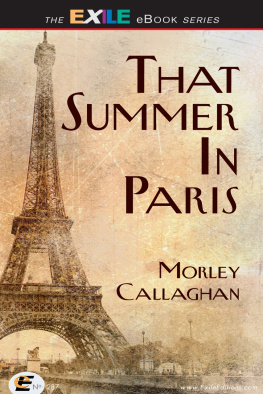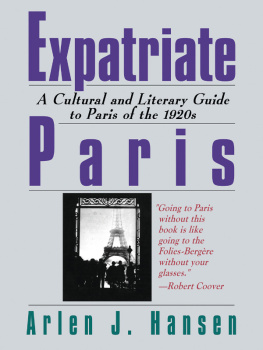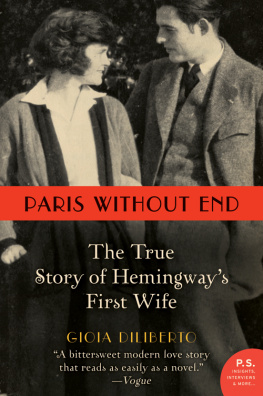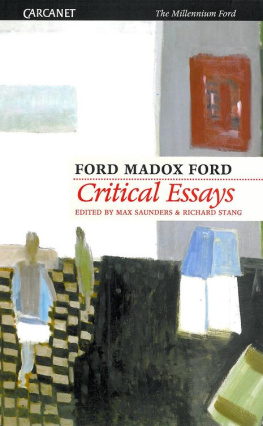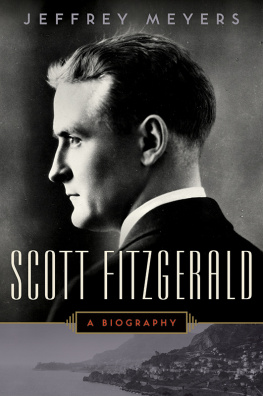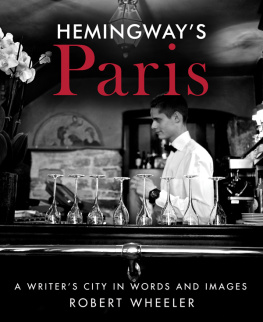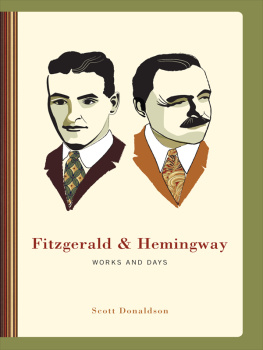CHAPTER 9
Lonely men who are always in public places, men like Sinclair Lewis, have always interested me. Perhaps they are able to sense that I am drawn to them, for I cant remember ever making the first approach. Just as it was part of my writing creed to distrust calculated charm in prose, so as a person, I suppose I felt it was beneath me to try to ingratiate myself with anyone who aroused my curiosity. Yet in one way or another I seem to get around to knowing the isolated men who interest me.
On the ship one night at dinnertime my wife said. Look at the priest sitting all by himself at the table over there. Why have they stuck him there all by himself? The reddish-haired, balding, freckle-faced, powerfully built priest didnt look aloof and self-contained; he simply looked like a man left alone in a big dining room. At out table there were five of us; a solid Midwestern businessman and his wife, both pleasant and both dull, and the ships doctor, an incredibly noble stuffed owl of a man. At the captains table were at least eight passengers, all in a convivial mood, and among them in jolly splendor, the Anglican or Episcopalian clergyman. Of course, it was an English ship.
After dinner in the lounge my wife spoke to the big lonely priest, and we sat down with him for an hour, and he told us about himself. This priest, whom Ill call Father Tom, for he may still be alive, was a Catholic chaplain for a California penitentiary hous-ing incorrigible criminals who were there for life. In ten years he had walked to the execution chamber with sixteen men. All this year he had been breaking out into strange intermittent fevers. His superiors and the doctors had grown daily more worried about him. They had persuaded him to take a three months leave of absence, tour the Mediterranean, then visit his old mother in Ireland. Above all, the doctors said, he was to try and enjoy himself; forget the prison, throw all his cares away, and at least for three months try to find some joy in life. He was to join his touring party in Paris.
Yet he was a jolly, jesting, laughing man. He had a quick intelligence. What relief to be talking to him after listening all through dinner to the endless flow of clichs from the ships doctor, whose punch line was Quite, oh, quite, and the solid banalities of the bluff businessman and his good-hearted wife. That night leaving us, the priest told us that he was to say Mass on Sunday on the tourist deck, the Anglican clergyman having been given the care of the souls of the first-class passengers. Would we be sure to come to Mass on Sunday? It was a little thing, but after all, we werent Anglicans, were we? We assured him we would come.
On deck the next day I spoke to him cheerfully and asked him how he was passing the time. Surprised, he looked at me, laughed, then wanted to talk. He had assumed that our friendship would not go beyond last nights polite encounter. A woman speaks to a priest; her husband listens sympathetically while the priest gropes around trying to tell them something about himself, the husband says little, and the priest asks them to go to Mass because he is a bit piqued at being regarded as an isolated figure among the first-class passengers. It was a pleasure, he said, to find I was a talkative man myself. We certainly talked, and about the philosophy of St. Thomas Aquinas. He was sharp-minded, and began to put me on.
After that, he attached himself to us. Nor did we tire of his company. At one moment he would be talking about the prison inmates; no penitentiary should be built that denied an inmate some wild hope of escape. Not that a convict might necessarily bring himself to try an escape. But he had a right to his harmless dreams, the exercise of all his ingenuity in his dream; it kept his mind alive; the remote possibility represented a last hope for men condemned to life imprisonment. Without this hope in the back of their minds the convicts would go crazy, he contended. Another time he would start talking about the views of St. Thomas on love, or hell as the deprivation of the love of God, or St. Thomas idea of beauty. Sometimes he would be chuckling to himself, just testing out my knowledge of St. Thomas. Or if we tired of convicts and philosophers he would have me exercise my gift for malice in little descriptions of the other passengers. He had a fine barbed comic spirit himself. Other passengers who might have noticed him at his lonely table would have been astonished by his alert awareness of their pretensions. Yet he would add charitably after some jest about an officer, Hes probably a good soul, a kind man. God forgive us.
I had noticed that often he would ask to be excused. Within half an hour he would reappear on deck, his hair freshly combed, his face washed, and wearing a fresh clerical collar. Sometimes, it is true, when he reappeared, he smelled strongly of whiskey. What was the idea? I asked, teasing him. Did he have to change his clothes to take a drink? No, he said apologetically. It was the sweat. Three times a day he would break out into sweats and be soaking wet, and he had to go and change all his clothes. It was also a good time to take a drink, wasnt it? But suddenly I avoided his eyes. I had a hunch that the doctors who had told him to tour the Mediterranean and have a good time had been sure that he had not long to live.
When the ship landed at Le Havre, I remember how he came to us chuckling to himself. Nodding at a portly gentleman who had taken a grandly opulent air with some friends, he said, See that fellow? Hes boasting that he had the biggest bar bill of all the passengers. I dare not disillusion him. But the fact is the steward just told me I did, and promised to keep it a secret.
On the trip to Paris I was so taken up with my own dreams and my sense of satisfaction at coming to the journeys end where I would meet my friends, I didnt pay much attention to the priest. I was reminding Loretto I had told her five years ago I would bring her to Paris. The priest may have been sitting behind us on the train. We didnt realize he wouldnt let us get out of sight. I was excited and eager. Even the neighborhoods of Paris seemed to be known to me. At college I had studied French. The history of Paris; the heroes, even the pictures of the principal buildings, the churches, the square were in the front of my mind. I couldnt believe I was a stranger. But coming out of the St. Lazare station, asking a porter for directions, I found my French was abominable. I had no sense of direction.
Since we had McAlmons address, the Paris-New York Hotel on the rue Vaugirard, we would get into a taxi and go to this hotel. It was about noontime. Then Father Tom appeared beside us, taking my arm. Like a shy apologetic boy, he asked us if we would have lunch with him at the Caf de la Paix. Before he joined his touring party, he said, he would like to sit with us at some famous French caf, and he had heard of this one.
For April it was surprisingly chilly, about as chilly as it would have been back home, so we ate inside the caf and drank too much wine. Outside on the rue de la Paix the girls were passing, taxis whirled by, the street life of Paris was just beyond our window. And I nursed a sweet satisfaction. For a long time, in my dream, I had seen us sitting here just this way.
The priest was to meet his party at a small Right Bank hotel, and we went with him to this hotel where we decided to register for the night so we could get our bearings. Then the priest had to leave us. I dont know what itll be like on this tour, he said gloomily. Well, look here. Ill be back in June. I could look you up, couldnt I? Would you mind very much? Then he added in a resigned tone, Ah, no, youll forget all about me. We swore we wouldnt, and as we watched him cross the lobby to meet an offi-cial of his tour, he had his head back like a man staunchly resigned to the company of a hundred middle-aged women, and convinced he would be allowed to drown in the depth of our memories without leaving a ripple.

